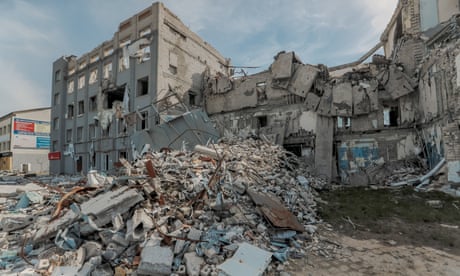- by foxnews
- 08 Apr 2025
New Ukraine positions near Kherson could signal spring offensive - report
New Ukraine positions near Kherson could signal spring offensive - report
- by theguardian
- 24 Apr 2023
- in news

Ukraine's military has set up positions on the eastern side of the Dnipro River near Kherson city, the Institute for the Study of War cites Russian military bloggers as saying.
Infiltrating the area could be a first step towards trying to dislodge Russian forces from positions they are using to shell and shoot at Kherson. The constant attacks have made it impossible for residents to return to normal life months after Ukrainian troops liberated the city from occupation.
Ukrainian military forays across the river could also mark the first tentative steps towards launching a long-awaited spring offensive to reclaim more territory.
"This is the first time ISW has observed reliable geolocated imagery of Ukrainian positions on the east bank along with multi-sourced Russian reports of an enduring Ukrainian presence there," the thinktank said in an update.
The Russian military bloggers said Ukrainian forces had established stable supply lines to their positions and "regularly conduct sorties in the area", the ISW said.
The reported positions were in marshy areas of islets and tributaries near the settlements of Oleshky and Dachi, the report said. Russia still holds those settlements.
A Ukrainian military spokesperson for the southern region declined to comment on reports that Ukrainian troops had achieved a foothold across the river.
"There is an ongoing military operation that requires informational silence. When it is allowed we will be sure to notify you," Natalia Humenyuk told TV channel 24.
Government officials and Ukrainian commanders have signalled for months that when the weather and troops were ready they would try to dislodge Russian forces from territory they still hold in the south and east of the country.
Moscow controls about 17% of Ukraine, although much of that is territory seized in 2014, including the Crimean peninsula and parts of Luhansk and Donetsk regions claimed by Moscow-backed proxy "separatists".
Ukraine's military repeatedly defied the expectations of even its staunchest allies during the first year of the war, repelling Russian forces that were thought to be larger and better armed.
Initial attempts to seize Kyiv were abandoned last spring after a fierce Ukrainian defence of the capital. An autumn campaign then liberated swathes of north-eastern Kharkiv and pushed Russian troops out of Kherson, at the time their last stronghold on the west bank of the Dnipro.
Nato's secretary general, Jens Stoltenberg, said on Friday that Ukraine was well-prepared to retake more of its territory in the next offensive.
"I'm confident that they will now be in a position to be able to liberate even more land," he told journalists after a meeting of key allies at the Ramstein airbase in Germany.
The country has received shipments of western tanks and other arms over the winter, and its forces have received training inside and outside the country on how to use them.
"One of the main issues here today has been to go through all the different capabilities, systems and supplies that the Ukrainians need to be able to retake more land," Stoltenberg said.
Ukraine has also been drilling newly mobilised soldiers to bolster ranks depleted by heavy casualties. The toll is a military secret, but recently leaked US military documents estimated thousands had been killed and more 100,000 wounded.
"We are actively preparing new brigades and units," the country's president, Volodymyr Zelenskiy, said in his evening address after the Ramstein meeting.
The US estimates Russian losses to be three or four times higher than Ukraine's, but national mobilisation and widespread recruitment in prisons by the Wagner mercenary group means Moscow can still deploy a large if inexperienced fighting force.
Months of virtual stalemate have also given Russian forces time to dig in extensive defensive positions along their southern line in anticipation of the coming Ukrainian offensive.
There has been widespread speculation that Ukrainian troops will try to push down through Russian-controlled areas to reach the Black Sea coast.
That would cut off a large portion of Russian forces stationed in Kherson, and virtually isolate forces in Crimea by severing the main land supply route to the peninsula.
The Kerch road and rail bridge, which connects Crimea to Russian territory, was badly damaged in an attack last year, and sea routes become unreliable in winter.
- by foxnews
- descember 09, 2016
Ancient settlement reveals remains of 1,800-year-old dog, baffling experts: 'Preserved quite well'
Archaeologists have recently unearthed the remarkably well-preserved remains of a dog from ancient Rome, shedding light on the widespread practice of ritual sacrifice in antiquity.
read more


